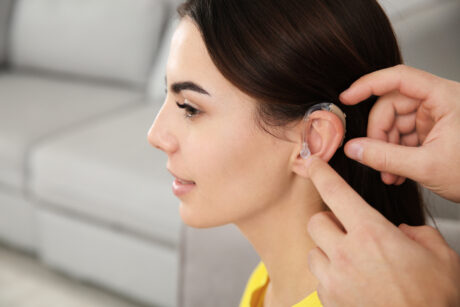Ear pain, also known as otalgia, can be a frustrating experience. This sharp, throbbing or dull ache in your ear can disrupt your day, making it difficult to concentrate, sleep or even enjoy a conversation.
Understanding the causes of earaches is crucial for finding the right treatment and preventing potential complications that could affect your hearing health. While earaches often resolve on their own, knowing when to seek professional help is important in ensuring proper care and avoiding any long-term issues.
Common Causes of Earaches
Earaches can stem from a variety of sources, both from within the ear itself and from referred pain originating in other areas. These include:
- Middle Ear Infections (otitis media): These occur when fluid builds up behind the eardrum, often due to a cold or allergies. This fluid can become infected, causing inflammation and pain.
- Outer Ear Infections (otitis externa or swimmer’s ear): These infections affect the ear canal, often caused by water trapped in the ear after swimming or bathing. Symptoms may include pain, itching and discharge. In some cases, fungal ear infections can also develop in the ear canal.
- Earwax Buildup: Earwax is naturally produced to protect the ear canal, but excessive buildup can create a blockage. This impacted earwax can press against the eardrum, leading to ear pain and discomfort.
- Eustachian Tube Dysfunction: The Eustachian tube connects the middle ear to the back of the throat, helping to regulate pressure. When this tube becomes blocked or doesn’t function properly, pressure changes can occur, resulting in ear pain. This is often associated with colds, allergies or sinus infections.
- Referred Pain: Sometimes, ear pain isn’t caused by a problem in the ear itself. Pain originating in other areas, such as the teeth, jaw (temporomandibular joint or TMJ) or throat, can be felt in the ear.
- Other Causes: Less commonly, earaches can be caused by injuries to the ear, foreign objects lodged in the ear canal or even sinus infections. Sharp pain in the ear can sometimes indicate a more serious issue, such as a ruptured eardrum.
Recognising the Symptoms
Ear pain can manifest in various ways, and understanding the specific characteristics of your earache can provide clues about the underlying cause.
- Types of Ear Pain:
- Sharp pain: This type of pain can be sudden and intense, often indicating an injury or infection.
- Dull pain: A dull ache can be persistent and may suggest pressure buildup or inflammation.
- Throbbing pain: This rhythmic pain often accompanies infections or inflammation.
- Burning pain: A burning sensation may indicate irritation or infection in the ear canal.
In addition to the type of pain, pay attention to any accompanying symptoms:
- Accompanying Symptoms:
- Fever: A fever often indicates an infection.
- Hearing loss: Difficulty hearing can be a sign of a blockage or damage to the ear.
- Discharge: Fluid draining from the ear may suggest an infection or ruptured eardrum.
- Dizziness: Dizziness or vertigo can indicate an inner ear problem.
- Others: Tinnitus, ear popping and other symptoms can accompany various ear conditions.
When to Seek Medical Attention
While many earaches resolve on their own, certain situations warrant prompt medical evaluation.
- Severe Pain: If the pain is intense, unbearable or interfering with your daily activities, seek medical help.
- Persistent Pain: If the earache lasts for more than a day or two without improvement, it’s essential to see a doctor.
- Infants and Young Children: Earaches in infants and young children should always be evaluated by a healthcare professional, as untreated ear infections has the potential to lead to hearing loss.
Treatment Options
How you treat an earache depends on what’s causing it. For mild earaches, these home remedies can often help:
- Warm Compress: A warm compress against the ear can soothe pain and reduce inflammation.
- Over-the-counter Pain Relievers: Ibuprofen or acetaminophen can help manage pain and fever.
If home remedies aren’t enough, or the earache is severe or persistent, medical treatment may be necessary:
- Antibiotics: If a bacterial infection is causing the earache, your doctor might prescribe antibiotics.
- Ear Drops: For outer ear infections or other ear conditions, your doctor might prescribe ear drops to reduce inflammation or fight infection.
- Earwax Removal: If impacted earwax is the culprit, your doctor or an audiologist can perform an earwax removal procedure.
Finding the Right Solution for Your Ear Pain

Earaches can be disruptive, but understanding their causes and getting the right treatment can bring relief and protect your hearing. Remember that ear pain can come from various sources, so it’s important to recognise the type of pain and any other symptoms you’re experiencing.
If you’re concerned about ear pain or have any hearing-related issues, Listening Lab can help. Our audiologists can diagnose the cause of your earache and recommend personalised treatment options, offering hearing solutions in Singapore such as earwax removal, tinnitus treatment and more. Schedule an appointment today for expert ear care and relief from ear pain!











